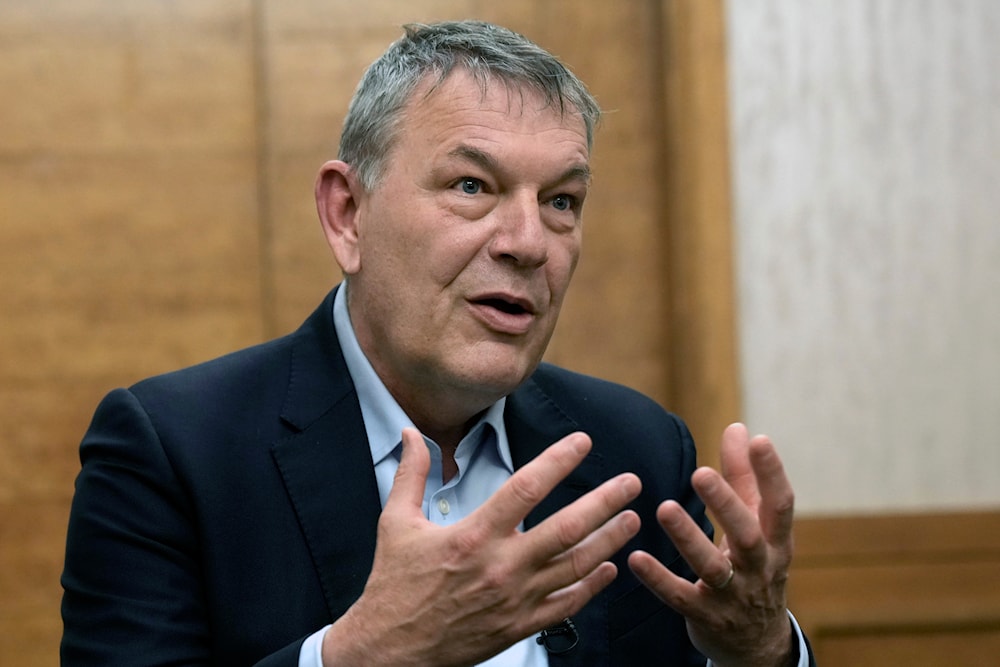UNRWA urged 'Israel' to lift its ban on humanitarian aid to Gaza
The Israeli blockade, imposed on March 2, risks the deaths of many children as medical supplies and electricity are cut off from the Strip amid its recovery from the year-long war.
-

Commissioner-General of the U.N. agency for Palestinian Refugees Philippe Lazzarini speaks during an interview with The Associated Press in Beirut, Lebanon, Thursday, Feb. 6, 2025 (AP)
UNRWA called on "Israel" to lift its ban on humanitarian aid from entering the Gaza Strip in order to stop the spread of starvation and suffering in the enclave.
"We have already seen first signs of increased prices on the market," UNRWA Commissioner-General Philippe Lazzarini said during a Monday press briefing, adding that as more time passes, the more the impact of the ban increases in Gaza.
Lazzarini added that "there is a risk of going back to the situation we experienced months ago, about deepening hunger in Gaza Strip... The block needs to be lifted."
"Israel" announced a blockade on the delivery of humanitarian aid to Gaza on March 2 and threatened to add more pressure on Hamas, as the Palestinian Resistance faction refuses the US proposal of extending the first of the ceasefire agreement.
'Israel' tightens Gaza blockade, violates ceasefire
In the latest measure to tighten its grip on Gaza, the Israeli Minister of energy Eli Cohen announced that he signed an order to cut electricity from the Strip on March 9, emphasizing that "Israel will "use all the tools at our disposal to bring back the hostages and ensure that Hamas is no longer in Gaza the day after [the war]."
Meanwhile, Israeli Occupation Forces continue to violate the ceasefire agreement, most recently shooting a Palestinian woman in western Rafah, according to Al Mayadeen's correspondent on March 10, while Israeli military vehicles opened fire in the town of al-Fukhari in Khan Yunis.
The head of the Government Media Office in Gaza, Salama Maarouf, urged the international community on March 8, International Women’s Day, to remember the massacres committed by the Israeli occupation, which have led to the killing of 12,316 women in Gaza.
UNICEF spokeswoman Rosalia Bollen warned on March 8 that the embargo risks the death of children, blocking both aid and fuel from entering Gaza, where insufficient electricity and fuel shortages jeopardize critical infrastructure, including hospitals and desalination plants, stressing the urgent need to scale up water production.
'Israel' obstructs second phase negotiations
On March 2, the "Israeli" government announced its unilateral endorsement of a United States proposal that stipulates an extension of the first phase of the Gaza ceasefire agreement until April 19, dismissing moving to the second phase of the ceasefire deal.
The occupation and Hamas were supposed to hold talks regarding the second phase of the ceasefire deal "no later than day 16," however, Israeli authorities did not engage in these talks until day 42 of the first phase, while maintaining IOF presence in the Philadelphi corridor.
Hamas, on the other hand, sent a delegation to Cairo on March 7 to discuss the implementation of the ceasefire deal and push negotiations for the second phase.
On March 9, Hamas reaffirmed its approval of the "Community Support Committee," a body responsible for civil governance in the Gaza Strip, to a high-ranking Egyptian intelligence officer, aligning with the framework agreed upon between Hamas and Fatah during Egypt-sponsored talks in December 2024.

 3 Min Read
3 Min Read








